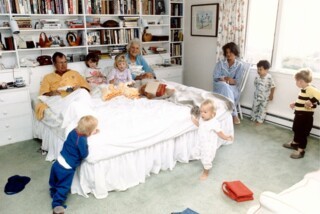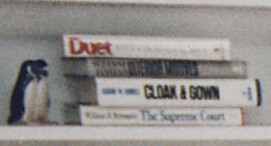Duet with the Bushes
Kitty Burns Florey
During the flurry of George H.W. Bush’s death, funeral and canonisation, it was impossible to escape the photograph of George and Barbara Bush at their house in Maine, in their PJs, sitting up in bed surrounded by a mob of grandchildren. First published in 1987 in Life magazine, it’s a candid shot meant to show that, in their homey, comfy setting, the vice-president and his wife were just regular folks: doting grandparents, game for anything, unfazed at being awakened early (reportedly, 6 a.m.; ‘Poppy’ does look a tad dazed) by an invasion of grand kids, stuffed animals, and – oh! hi there! come on in! – a photographer.
Behind the vice-presidential bed is a reassuringly messy bookcase, stuffed not only with photos, a clock, coffee mugs and various doodads and tchotchkes, but actual books. My fifth novel, Duet, is at the top of a stack of them, just above the veep’s head. My agent spotted it in Life when it appeared, and mailed the picture to me. Somewhere, I have it still, creases and all. I was flabbergasted by it, and so was everyone who knew me. An old friend said it was the first thing he thought of when he heard Bush had died. A novel of mine lurking a mere foot above the head of the vice-president of the United States? A novel of mine? What was that about?
Duet, published by William Morrow & Co., had just come out – reviews good, sales middling (story of my life). Why was it taking up space on the Bushes’ bookshelf instead of, say, the new Stephen King? Patriot Games? The Bonfire of the Vanities? Beloved? Trump: The Art of the Deal? Big books, hot off the presses! My book was definitely a small book. And yet there it was.
Had Barbara Bush read the glowing Washington Post review and picked up a copy? Was she strolling through a bookstore (did such people stroll through bookstores?) where the hideous dust jacket caught her eye? Or could she even have bought it because she’d liked my previous books?
My agent had a more realistic theory. What it all meant was probably not much. Most likely, an editor at Morrow had sent Barbara Bush a selection of their new books. She was working on a book of her own, reportedly under contract to them. Three years later, her bestselling memoir about the family dog – Millie’s Book: As Dictated to Barbara Bush – was published by Morrow. Close inspection with a magnifying glass backed up the theory. At least two other books in the Duet pile were published by Morrow in 1987: the revised edition of a history of the Supreme Court by Justice William Rehnquist, and a book by the historian Robin W. Winks about the role of Yale scholars in the Second World War.
Mystery solved. Chagrined chuckles all around. Excitement terminated.
Still, I’m a novelist, and gratifications are few and far between. I admit I was flattered that my humble effort had been seen by someone, somewhere, at some level, as being on a par with two serious tomes by writers of eminence. Rehnquist and Winks, the heavy stuff, for the vice president (maybe in hopes of a blurb), and a work of fiction (lightweight by its very nature) for the second lady.
I will never know, but looking at the photograph after all these years, I wonder: did Barbara Bush ever read Duet? Just because it was a freebie from her editor, doesn’t mean she didn’t. (My editors also sent me freebies – those were the days – and I read a lot of them.) I didn’t pay much attention to the Bushes when he was vice-president – too busy being appalled by President Reagan. But Mrs B. seemed like a good egg. She was politically more liberal than her husband. She begged the Secret Service to allow her to take commercial flights. She was stout and dowdy. She liked to garden. She liked to read!
If a later photo had been taken, the book might very well have been missing, donated unread to the church book sale or the Kennebunkport Public Library. But maybe not. Maybe Barbara wolfed it down, bought copies for her friends, packed it up and took it to the White House when they moved in, mentioned it to Queen Elizabeth or Václav Havel when they visited. True, I didn’t get one of the gracious, appreciative notes she was famous for – but maybe she was too busy raising money for literacy and forgot. Or she might have gushed about the book to her editor, who neglected to pass on the compliment. (Editors are even busier than wives of vice presidents.) Or maybe she never did get around to reading it, but her daughter-in-law, Columba – Jeb’s wife, who’s off to one side in the photograph, wearing a blue Lanz nightgown (I had a red one just like it!) – spotted the book, was intrigued, and asked to borrow it. Or the famously bookish Laura Bush might have stumbled on it, read a page or two, and got hooked.
Duet, the story of a singer, is set during the Vietnam War. Bush staunchly supported the war when he was a congressman. As president, he had a few things going for him: he wasn’t Reagan – huge plus. And he served only one term. And he coined the phrase ‘voodoo economics’. More seriously, he had a hand in the Americans with Disabilities Act, the Clean Air Act, and the expansion of tax credits for families with children. All these had prominent billing in the hagiography when he died.
Less mentioned was his ruthlessness in pursuit of the presidency, which included not only some classic false humility (the butlered-and-chauffeured product of Andover and Yale reminiscing in campaign speeches about how, newly arrived in Texas and ‘living in a little shotgun house’, he and Barb had struggled to make it), but Willie Horton and Lee Atwater. Later came Clarence Thomas, the Iran-Contra pardons and the Gulf War, which, like Vietnam, was built on lies, evasions and distortions.
A few days after Bush’s death, when the worship had died down a bit, a video went viral of a young hospital volunteer, identified only as ‘Nayirah’, tearfully testifying before Congress in October 1990 that she had witnessed Iraqi soldiers ‘come into the hospital with guns. They took the babies out of the incubators, took the incubators and left the children to die on the cold floor. It was horrifying.’ Horrifying for sure, but not true: Nayirah al-Sabah, the daughter of the Kuwaiti ambassador, had been coached. But her testimony tore a hole in the hearts of Americans and gained Bush the support that had been lacking. The widespread ‘No Blood for Oil’ protests all but disappeared. I lived in New Haven then, and on my way to work every day I passed a high school where dangling out of a third-floor window was a bed sheet on which was awkwardly inscribed: ‘USA #1’. The slogan became ubiquitous: a war masquerading as a football game. A war for oil led by an oilman. Americans and allies killed: 382. Iraqis killed: somewhere around 200,000. And PTSD? Let’s not go there.
But de mortuis and all that. What it all shakes down to is that George H.W. Bush now exists on a scale where at one end he’s a god, somewhere in the middle he’s a great president, and at the far end he’s a good man with a couple of bad ideas. Whatever. At this point, who cares? Let his ‘service dog’, Sully, sit by the casket, ‘his head bowed in unison with the Bush family members that surround him’. Let’s just go with it, if only because any kind of balance and restraint, not to mention benevolence and toleration, have gone the way of bipartisanship, courtesy and respect for a free press. ‘I Really Don’t Care, Do U?’
Because who doesn’t look better by comparison with what’s in the White House now? Even Warren G. Harding. Even Reagan. Even Dubya. Even Nixon. It all reminds me of the Vomit Sandwich Quandary of my high school days: would you rather go out with Joey McGregor or eat a vomit sandwich?
As for Duet – well, it’s in intensive care, hooked up to tubes. But not dead yet! A sleazy paperback continues to exist, more or less (last year’s royalties: $24.46), and it can be had as an e-book. Its ranking on Amazon is around the eleven-million mark, but the five readers’ reviews are all five-star. And maybe soon, as family members are sorting through the detritus of the ages in that house in Maine, some Bush or other will find my book, read it, and remember that a cousin in the movie business has been looking for a Vietnam-era book to adapt into a major motion picture … You never know.
The important thing is to stay cheerful. I can still muster up a bemused smile when I look at that photograph: my book on the shelf, its unmistakable bright red title plainly visible. There it will sit for ever, its best shot at immortality. And probably mine as well.


Comments
When did the US last have an honest president? - or the UK an honest prime minister?
This seems to overlook that he was a CIA official in the 50s and 60s and actually the head of the CIA for a period in the 1970s when he oversaw Operation Condor which caused huge misery and death in Central and South America.